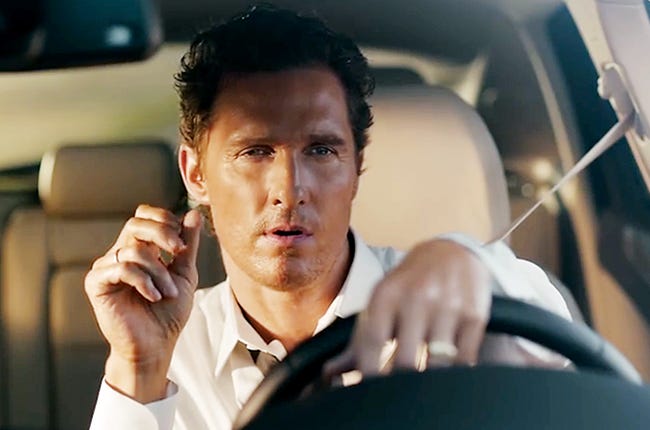
View
Some commercials stay with you. Perhaps they resonated during a particular time or place, or became a cultural talking point like Apple’s 1984 Super Bowl spot introducing the Macintosh or Wendy’s iconic question - also, interestingly, from 1984. Or perhaps they resonated with you because you just enjoy them. Or maybe you like the product and a good commercial for it validates … you somehow. Because commercials are about desire. And your desire, met by this product in some way, is validated by this commercial, this 30 second expression of why anyone would or should desire this thing. You probably have a favorite or two.
Infiniti made a splash in 1989 with its introductory commercials. It was a new luxury brand - we had seen, and desired as symbols of luxury, Mercedes and BMWs for years, and this was to be a new offering in this status driven category. How did they introduce us to their new luxury car? They did it without really showing us the car. It was about a feeling, a sense, a “true idea of luxury”. These spots were both widely criticized and widely successful. We bought the idea, the feeling, the vibe.
The gamble has apparently paid off. So far, more than 60,000 people, many more than expected, have dialed the toll-free number in the ads to find out the location of the nearest Infiniti showroom. More important, since the Infiniti went on sale three weeks ago, the 50 Infiniti dealerships across the country have been inundated by thousands of people eager to see the mysterious new luxury car.
From its start in August, the $60 million Infiniti campaign has featured a lot of talk and very little automotive action. The commercials show shots of a field of pussy willows or rain falling on a pond as an announcer talks about the harmony that exists between nature and man.
But this approach has been widely criticized within the advertising industry. And despite the apparent success of Infiniti, many analysts and advertising executives remain skeptical that its creative departure will influence the look of auto ads to come.
Quietly, Infinity Creates Excitement - NYT - December 1, 1989
A more recent series of ads has an update on this vibes strategy. Matthew McConaughey stars in a number of Lincoln spots where the car is present, but secondary. We are encouraged to identify with the driver. Not the particular idiosyncrasies of this particular movie star, but the person of means who goes his own way - who has his (or hers, I suppose, but men appear to be the target here) own idiosyncrasies. It may seem strange to appeal to a vision of unique idiosyncrasies in a mass market ad, but we don’t analyze the appeal, we experience it. I can drive anything, and I know other things might appear to have more status, but, because I am me, I am bestowing my own status on this Lincoln (along with Matthew McConaughey - who may not actually drive one).
Some products have had a string of successful ads, partly because the product is well liked and profitable and, therefore, has a healthy advertising budget. Coke has the construction worker (actually Diet Coke), and super cute Polar Bears, among others. But before all of those, they also would like to buy the world a Coke - not only that, they (or we?) would like to buy the world a home, and furnish it with love - grow apple trees, and honey bees and snow white turtle doves (it was 1971, a different world). Then we would like to teach the world to sing in perfect harmony … and, in our crowning act of humanitarianism, we (men and women from all over the world) would like to buy the world a Coke, and keep it company. Or, failing all of that, we could just buy more Coke and be somehow associated with this warm feeling of wonderfulness.
All of these appeals to our thirst, our desire, lead us to a question: What do you want? What do you thirst for? Really - not what you know you should want, but what you really want.
God’s people - and all people with them - have been faced with this question from since there were God’s people. You may be familiar with the tragic history of God’s people in the Old Testament, the nation of Israel. Most of that history can be explained as a cycle of failed attempts to get what they wanted instead of what was offered them by God. Instead of blessing, they, over and over, sought what seemed like security from pagan gods or alliances with neighboring kingdoms. Over and over, God called them back to a simple dependence on Him, which is what would truly satisfy them. Here is just one of those appeals, through the prophet Isaiah -
“Come, all you who are thirsty,
come to the waters;
and you who have no money,
come, buy and eat!
Come, buy wine and milk
without money and without cost.
Why spend money on what is not bread,
and your labor on what does not satisfy?
Listen, listen to me, and eat what is good,
and you will delight in the richest of fare.
Give ear and come to me;
listen, that you may live.
I will make an everlasting covenant with you,
my faithful love promised to David.
Isaiah 55:1-3
Time and time again, the people of Israel wanted to choose some of what came with a relationship with God - but also a back up plan for their identity and security. Instead of being a picture of God’s people to the world for their blessing, they looked like any other nation. Just to be clear, I am not talking about politics here. The analogue for Israel is the church. We, for similar reasons, are at risk of looking like any other interest group. That is adjacent to my point, but I am asking a bit more of an individual question. What do you want? Here we see the invitation, when placed next to the iconic ads above, it may seem like any other appeal to our thirst. What (and Who) is behind the appeal make it completely different. Come, all who thirst, or, perhaps, all who admit that they thirst - and get more than you ever could ask for - the faithful, covenantal love of God - for free. No strings. Why chase after what can’t satisfy?
The 1971 Coke campaign “I’d Like to Buy the World a Coke …” is tied to the end of the Mad Men television franchise. Don Draper, the principle character - unmoored, driven, talented, haunted - comes to the end of his rope. At the end of the series, he is in a group meditation session in Hawaii - seeking a break and, we hope, a new direction for his troubled life. As he meditates, a smile spreads across his face. Inner peace? Perhaps not. The scene shifts to the choir - which looks a lot like his meditation group - singing “I’d Like to Buy the World a Coke …”. The implication seems to be, instead of inner peace, he found what he was really thirsty for - an ad that would make him famous.
We might say his thirst was too small. But I don’t think that is quite right. What he settled for - fame, riches, stardom, status - was too small - it could not satisfy. Why spend money on what isn’t bread? Because we think it is. We are called to trust that there is a Bread of Life - and that only that bread can satisfy. I write all this because we have all the same problems and tendencies that the people of ancient Israel had. We all thirst, and we look around at what our culture tells us will satisfy, at what we want to believe satisfies - and we can be persuaded, as they were.
On the last and greatest day of the festival, Jesus stood and said in a loud voice, “Let anyone who is thirsty come to me and drink. Whoever believes in me, as Scripture has said, rivers of living water will flow from within them.” By this he meant the Spirit, whom those who believed in him were later to receive.
John 7:37-39
Here Jesus makes an appeal to anyone who is thirsty. That is all of us. He promises a return we are not looking for, a return we have not imagined. He promises that not only that our thirst will be satisfied, but that rivers of living water will flow from within … that we will be tapped to the source, the Holy Spirit, and that we can be a spring not only for ourselves but for those around us.
We can smile at the warm fantasy of buying the world a Coke and keeping it company - but something much better is offered. Coke is the Real Thing (TM) - but it isn’t this. We can see the whole ad is, unwittingly I’m sure, an echo of something we are called to. Being the presence of God in the world - a river of living water - the only thing that can satisfy what we really thirst for.
Links
Apple Macintosh Super Bowl Ad - 1984
Wendy’s Where’s The Beef Ad - 1984
Coke - I’d Like to Buy the World a Coke Hilltop Ad - 1971
Quietly, Infinity Creates Excitement - NYT - December 1, 1989
Lincoln MKZ - Matthew McConaughey - Ads - 2015
Mad Men - I’d Like to Buy the World a Coke - Mad Men series finale - AMC



